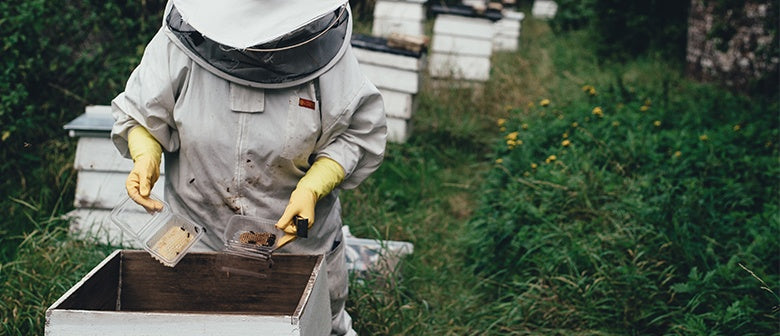Q & A with a Beekeeper
We chatted with beekeeper, Dwyllis Maggs from Wellington about beekeeping and the hives that she keeps in her garden at home.
What got you into beekeeping?
I wanted to help the bees. I also thought it would be good for me and for my garden.
What are the tools and steps to being a beekeeper?
You will definitely need a bee suit, gloves, smoker, a hive tool and hiveware. In regards to the latter, you can buy pre-cut wood and assemble your own boxes and frames to keep costs down.
Joining a beekeeping club is also a great idea. The Wellington Bee Club has its own apiary and will loan you a suit so you can get amongst the bees before you take the next steps.
The club also offers informal beginner talks once a month as part of their meeting and if there’s enough demand they will run a series of beginner classes about different aspects of beekeeping.
It’s also important to get to know other beekeepers so you can ask for help and advice when needed.
Where and how did you source your hives?
I bought my bees from another registered beekeeper. The Wellington Bee Club now sells bees.
Never buy from unregistered keepers and make sure the bees are free of disease.
I only keep four hives which is the maximum you can keep in an urban area.
Best location for a beehive? Does the location matter?
The best location for a hive, is a sheltered spot which gets at least morning sun. Avoid areas that flood or are very windy (unless you can put up a windbreak). There should be a source of water close to the hive.
In urban areas, out of courtesy locate your hives as far from neighbours as possible.
In rural areas keep a proper distance from the hives of other beekeepers.
Your bees won’t thrive in if they have to compete with lots of other bees for food. Nor will they thrive if are too exposed to hot Summer sun or cold southerlies in Winter.
Do bees from different hives have different temperaments?
Yes, definitely. The majority of the bees in the hive are female worker bees. They all have the same mother (the Queen) but their fathers (drones) can be different. The Queen will mate with several drones if she can. The worker bees are half sisters to each other. The male bees don’t have a father, only a mother (again the Queen) – they develop from an unfertilized egg. Hence the temperament of the hive can change depending on the temperament of the Queen and of the different drones the Queen has mated with.
What does the honey-making process entail?
The bees collect nectar from flowers, add enzymes from their stomachs, reduce the water content and at precisely the right moment they cap the comb with a thin layer of wax. A single bee makes a teaspoon of honey in its lifetime.
What do you do with the honey?
I jar lots of honey and make wax wraps and creams to give away as gifts.
What do you enjoy about beekeeping?
Bees make you pay attention to nature – you begin to notice the weather, the changing seasons, which plants are in flower. You start to learn about the life cycle of honey bees, native bees, wasps, bumble bee, varroa. You refine your sense of smell and you get to know your hives.
What is your advice for an aspiring beekeeper?
Join a club and take every opportunity to get involved with bees before you get your own. It can be daunting the first few times so persevere.
What is the best thing someone can do to help the bees?
Plant bee-friendly plants and stop using chemicals in your garden.
If you’re in Wellington and would like to know more about beekeeping or how you can support the bees, head to: www.beehive.org.nz

